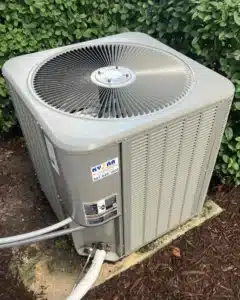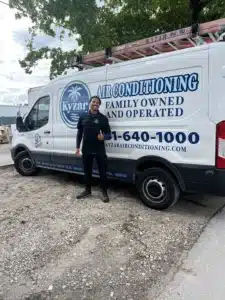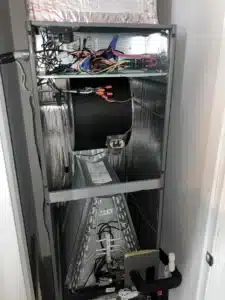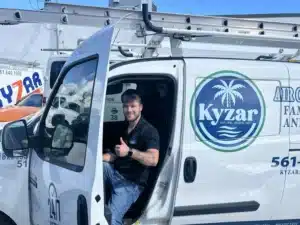How Aging HVAC Equipment Impacts Energy Bills
In a warm coastal climate like West Palm Beach, air...
A central air conditioner that fails to cool your home can be a frustrating experience, especially during hot summer months. Before reaching out to HVAC professionals, there are practical troubleshooting steps you can take to identify and potentially resolve the issue. In this article, we’ll outline factual and informative steps to troubleshoot a central air conditioner that is not cooling effectively.
Begin by verifying the thermostat settings. Ensure that the thermostat is set to the desired temperature and is in the cooling mode. Sometimes, incorrect thermostat settings can lead to inadequate cooling.
Clogged or dirty air filters can restrict airflow and impair the cooling efficiency of your system. Check and replace air filters regularly, as recommended by the manufacturer. Clean filters promote better airflow and help your central air conditioner operate at its optimal capacity.
Head outdoors to inspect the condenser unit. Ensure that the unit is free from debris such as leaves, dirt, or grass clippings. Trim any vegetation around the unit to allow proper airflow. A clean and unobstructed condenser unit facilitates efficient heat exchange.
Inadequate refrigerant levels can significantly impact the cooling capacity of your central air conditioner. If you notice reduced cooling performance, ice buildup on the coils, or hissing sounds, it may indicate a refrigerant issue. Consult with a professional HVAC technician to assess and adjust refrigerant levels.
Leaks or damage in your ductwork can lead to cooled air escaping before reaching your living spaces. Inspect visible ductwork for any signs of leaks, disconnected sections, or damage. Seal any leaks with duct tape or mastic sealant and ensure that ducts are properly insulated.
Ensure that air vents throughout your home are open and unobstructed. Blocked vents restrict airflow and can lead to uneven cooling. Rearrange furniture or remove any items blocking vents to allow for proper air distribution.
Over time, evaporator coils can accumulate dirt and affect their ability to absorb heat. Inspect the coils and clean them if necessary. Use a soft brush or a coil cleaner to remove debris gently. Well-maintained evaporator coils contribute to efficient cooling.
The capacitor and contactors in your outdoor unit play crucial roles in the cooling process. Inspect these components for signs of wear, damage, or burning. Faulty capacitors or contactors may need replacement, and it’s recommended to seek professional assistance for this task.
A malfunctioning fan motor can impede the airflow, affecting the cooling efficiency of your system. Verify that the fan is running when the system is in cooling mode. If the fan is not operating, it may indicate a faulty motor that requires professional attention.
Inspect the electrical components of your central air conditioner, including fuses and circuit breakers. Tripped breakers or blown fuses can interrupt power to the system. Reset breakers or replace fuses as needed. If issues persist, consult with an electrician or HVAC professional.
Troubleshooting a central air conditioner that is not cooling involves a systematic examination of various components. While some issues can be addressed through DIY measures, it’s essential to recognize when professional assistance is required. Regular maintenance, timely repairs, and attention to system components contribute to the reliable and efficient operation of your central air conditioning system.

In a warm coastal climate like West Palm Beach, air...

Living in West Palm Beach means living with heat, humidity,...

Florida HVAC systems work harder than those in almost any...

Indoor air quality plays a major role in how a...

Ventilation is one of the most important yet often overlooked...

In Florida, air conditioning is not a luxury. It is...